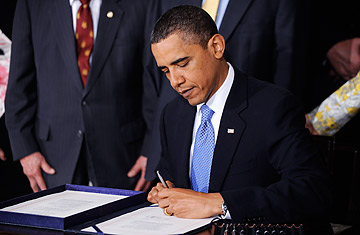
President Obama signs the Caregivers and Veterans Omnibus Health Services Act at the White House
America's daughters have been serving in the U.S. military for centuries, and they're being deployed to Iraq and Afghanistan in unprecedented numbers. But back home, they're still not guaranteed that the bathrooms at veterans' health care centers will be stocked with tampons. The Government Accountability Office published an audit this spring that found some of 19 health care facilities it surveyed did not always have private bathing areas, even in mixed-gender units. Such lapses in women's health care are growing more painfully apparent as the number of females using the Veterans Affairs (VA) health care system is projected to double in the next five years. But in a landmark step toward addressing their needs, President Obama on Wednesday afternoon signed a bill bolstering care for female veterans, which was part of the Caregivers and Veterans Omnibus Health Services Act of 2010.
"Our obligations to our troops don't end on the battlefield," Obama said at the signing in the State Dining Room at the White House. "Just as we have a responsibility to train and equip them when we send them into harm's way, we have a responsibility to take care of them when they come home."
Among other measures, the legislation — which was passed with broad bipartisan support — requires the VA to train mental health professionals in caring for the 1 in 5 military women who have survived sexual trauma, which increases the risk of mental health issues like posttraumatic stress disorder by nearly 60%.
The bill also authorizes research on the effects of the wars in Iraq and Afghanistan on women's physical, mental and reproductive health. U.S. soldiers have to carry a lot of heavy gear — duffel bags, bulletproof vests, thick boots — through Iraq's dry, 120-degree heat. A reluctance to add to the load by hauling water may lead more female soldiers to become dehydrated in the desert, according to Dr. Samina Iqbal, a member of the VA's national Women Veterans Health Strategic Health Care Group, who notes that some 34% of women return home with genitourinary issues — reproductive system disorders, urinary tract infections and the like — compared with just 8% of men.
The legislation also requires a comprehensive assessment of the unique barriers to care that women face. Veterans' advocates speculate that limited access to childcare and the perception that VA hospitals are geared toward old men are among the reasons that female veterans are less likely than males to use veterans' hospitals, even for such gender-neutral care as colon cancer screenings and flu shots.
In addition to the bill's specific provisions, the legislation serves as a high-profile reminder that women fight and fall wounded overseas, and come home with scars that aren't always healed by a health care system that has roots dating back almost a century, to a time when service members were mostly men.
Advocates of the bill also note that it sends a message to female veterans that their needs are important to their country. When one of the bill's sponsors, Washington Senator Patty Murray, travels around her state holding veterans' roundtables, she often finds female veterans more reluctant than men to voice their health care concerns. "They wouldn't speak up," she tells TIME. "They'd wait until the end of the meeting and walk up to me and whisper, 'I need to tell you what happened to me.' " Getting Obama to sign the bill, she adds, "is a recognition of the service that women do and the needs that they have when they come home."
